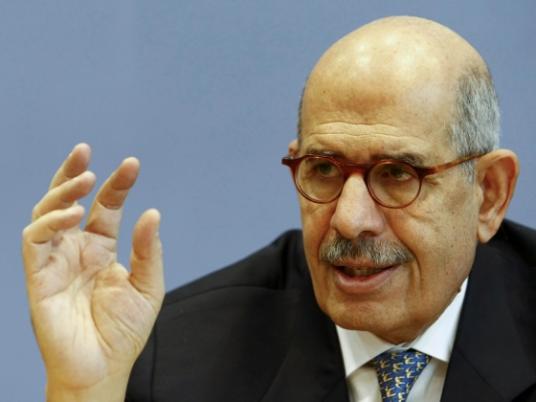Gehan Shaaban has come a long way since her youthful days as a radical Trotskyite student.
In the early 1990s she joined forces with a small group of far left political activists in Egypt and founded an organization called the Revolutionary Socialists.
They were inspired by radical Palestinian-British politician Tony Cliff, who was born in 1917 to a Jewish family living in the Holy Land and became a fervent anti-Zionist after emigrating to the UK.
In those days, said Shaaban, things were very bad for the left. “There was no movement at all,” she said. “In the 1990s it was a time when you could not say the word “socialism” because it was the era of the new liberalism and the end of the USSR.”
But now things are beginning to change: With the fall of former president Hosni Mubarak a new political left is emerging in Egypt.
The writing was very much on the wall during the leftist Tagammu Party conference last Saturday, when 73 members resigned due to their exasperation with leader Refaat al-Saeed. They feel his closeness to the Mubarak regime and failure to endorse the recent uprising fatally dented his credibility.
Many have joined the Popular Alliance, a recently-created confederation of different movements which is seeking to bring the notoriously fractious elements of Egypt's left under one umbrella.
Shaaban joined the alliance with a Trotskyite party she helped form last year, the Socialist Renewal Current.
She said: “This is not the first time people have tried to have a party made up of different leftist groups. But in the past people have only been thinking about their own organizations and how to demand their own ideas. But now we have a different approach. Working together has made people closer. In the past we never had this chance.
“Now if there are differences it will be between real political issues and not just ideology.”
The Popular Alliance is comprised of an assortment of ex-communists, socialists and disaffected Tagammu members.
According to Rabab al-Mahdi, a professor of political science at the American University of Cairo, the Popular Alliance has a “lot of potential” for becoming a credible umbrella party for the left.
She said: “It is not like a workers’ party which does not appeal to the intelligentsia. The Popular Alliance has a niche because it can appeal to both.”
Yet in many ways it all sounds too good to be true. Is it realistic to think that such divergent points on the leftist spectrum can ever work together? Shaaban admits that although people are working together now, it might be different once the afterglow of Mubarak’s ouster begins to fade.
“Who can we say what will happen in two year’s time? Two years ago we didn’t see a revolution coming in Egypt. We know we are different, but we know we need each other. That’s why this party is built on freedom and difference.”
They will be helped along their way by Akram Youssef, a 30-year-old former Tagammu member who helped found the Progressive Youth, an organization devoted to promoting the causes of the left around Egypt.
Although not a political party, Akram said his organization is campaigning to raise awareness about activism in communities around Egypt, and then transferring the political know-how into votes for members of the Popular Alliance and other leftist parties.
He said: “There are a lot of militant young people in Egypt now. They want to see Egypt run in a different way and don’t want to accept the Muslim Brotherhood.”
But not everyone is convinced. One man who doesn’t think that a “big tent” for the left is possible is Farid Zahran, who last Friday established his own leftist organization, the Egyptian Social Democratic Party.
“The Popular Alliance cannot succeed,” he said. “They say one thing and do another thing. What they want to do is get all the groups together with one identity, not for each group to have their own identity.
“It’s not practical and it’s not democratic to think they can stay together. I believe diversity is a good thing. Unity is something imaginary and cannot always be true. We can be together sometimes but not all the time.”
As the name of his party would suggest, Zahran believes the time has come to fuse together socialist principles with market values.
He said that the defining cause of the revolution — freedom, dignity and injustice — could be addressed by acknowledging the importance of the private sector and utilizing its potential value to drive social reforms.
He said: “We want political and economic freedom with social justice. That’s what social democracy is.”
Yet Egypt has never had a strong social democratic movement — the kind of “third way” politics between the unreconstructed left and free-market right which has become the norm in Western leftist thinking — and it is unclear whether the electorate will buy into it.
But Zahran believes people are ready.
“Under Mubarak there was no space for social democracy, because without democratic systems all the movements take radical stances. But I think the space now for social democracy is huge, and I hope that our party can be the one to fill it.”
One party which perhaps isn’t feeling quite so optimistic right now is Tagammu, especially after Saturday’s string of resignations. Those who resigned took the drastic step after failing to pass a motion of no confidence in al-Saeed.
Many among the Tagammu rank and file accuse al-Saeed of not doing enough to endorse the revolution — and perhaps more seriously, of being tucked-up too snugly with the regime of ousted president Hosni Mubarak.
Speaking to Al-Masry Al-Youm, al-Saeed rejected the accusation.
He said: “Nobody can dare to say they were more critical of Mubarak than we were. We’re the only party who has demanded from 1981 that the president should only be elected twice.”
He added that Tagammu would continue to criticise the ruling military council for “Islamising the voting process” during the recent referendum.
But according to Talat Sahmy, former Tagammu secretary general of the Giza Governate who quit the party on Saturday, al-Saeed’s continued leadership is destroying the movement’s credibility with the public.
He said that Tagammu has “become a bad name in the street,” citing a number of reasons including al-Saeed’s perceived closeness to Mubarak, his supposed reluctance to demand real reform of the Egyptian political system and his refusal to withdraw Tagammu parliamentarians after the revolution started.
He added: “I know many people who wanted to join the party, but didn’t because it was Tagammu.”
Despite this, al-Saeed said he believes Tagammu is still a credible force. “We have the students, we have the workers. We’re the largest leftist and liberal organisation in Egypt. Nobody can deny this, and we are trying to increase our activities.”




